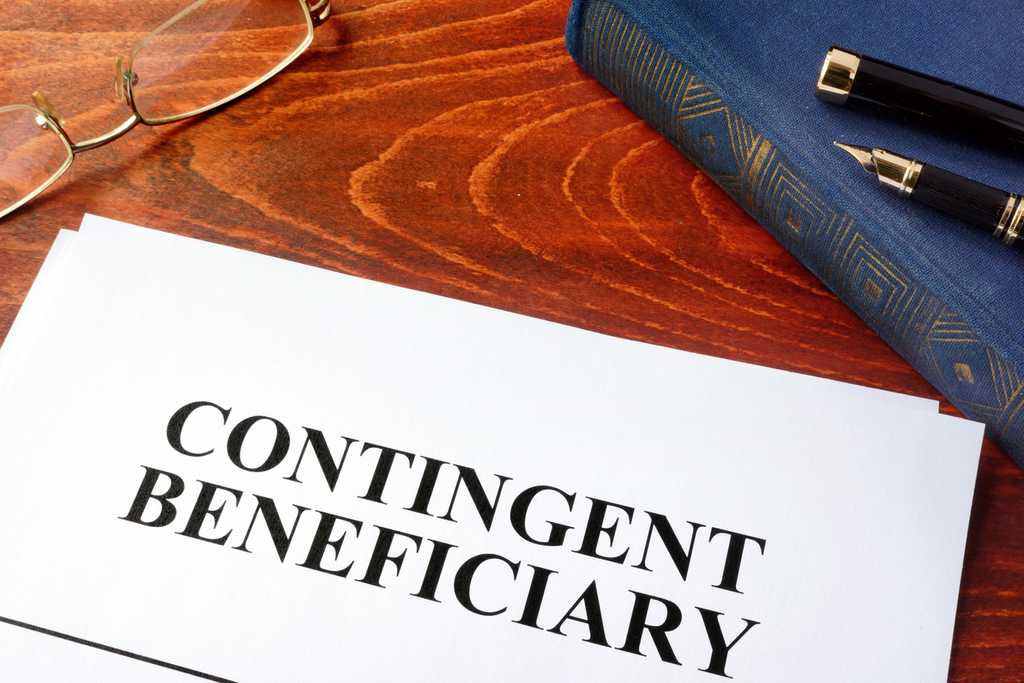If you have a will, trust, life insurance policy, or retirement savings account, you will be asked to name a beneficiary. This is the person who will receive your assets when you die. But naming beneficiaries isn’t always simple. What happens if your main beneficiary dies before you or is unreachable upon your death? For this reason, you need to also name at least one (but ideally more) contingent beneficiary as well.
A contingent beneficiary acts as a backup in case your primary beneficiary is deceased or unreachable (or declines to accept the inheritance from you). By naming at least one contingent beneficiary, you can help ensure your money goes to the people you want it to go to. Without a beneficiary, your estate will have to go through the probate process, which can be very lengthy and expensive and could end up with your assets distributed to people you’d prefer not to benefit.
How does contingent beneficiary assignment work?
When you first write your will or take out an insurance policy, you will be asked to designate one or more beneficiaries. This is the person, or people, who will inherit money upon your death. You’ll need to name at least one primary and at least one contingent beneficiary (though ideally, you’ll name several).
When naming beneficiaries, think about who in your life you would like to receive money from your estate when you die. In most cases, it’ll be a spouse or partner, or a child or children. You may also want to name a sibling, close friend, or even a charity to your list of beneficiaries. Before naming anyone as a primary or contingent beneficiary, make sure you discuss it with them so they know what to expect.
If you’re naming a minor as a contingent beneficiary, be aware that the child may not receive the money until they are at least 18 years old. You can specify an age at which they can receive the money, or you can put certain conditions on their inheritance (for example, requiring your child to graduate from college before being eligible to receive the money). Any minor child named as a beneficiary will need to have a guardian appointed who can hold the money for them until they are eligible to receive it.
Primary vs contingent beneficiary
A primary beneficiary is the first person who will be contacted upon your death to distribute your assets. You can name one person (such as your spouse) or several people (such as your spouse and your two grown children) as primary beneficiaries. As long as those people survive you and can be found by the executor of your estate, they will inherit your assets as you lay out in your trust or will.
If for some reason one of your primary beneficiaries dies before you or isn’t reachable after your death, you’ll need contingent beneficiaries who can inherit your assets in their place. Many people will choose to name their spouse as the primary beneficiary and their children as the contingent beneficiaries. In this case, your spouse would inherit your assets as long as they do not predecease you. If they do die before you, then your assets would go to your contingent beneficiaries; i.e. your children.
With both primary and contingent beneficiaries, you can specify who gets what percentage of your assets. For example, you can state that your primary beneficiary receives 100% of your assets upon your death, and that your two contingent beneficiaries each receive 50% of your assets if your primary is dead or not able to be found. You can split your assets however you like; it does not need to be equal between your contingent beneficiaries.
Frequently asked questions (FAQ)
Do I need a contingent beneficiary?
Yes, you absolutely need a contingent beneficiary. If you don’t name one and your primary beneficiary is deceased or not able to be contacted, the fate of your inheritance will be decided upon by the probate court. That might mean that your hard-earned money could end up in the hands of someone you don’t trust, like an estranged relative.
What is the point of a contingent beneficiary?
The point of a contingent beneficiary is to make sure your money goes to the people you want it to go to when you die. In your will, you’ll name a primary beneficiary (or multiple) who should receive a portion of your assets upon your death. By naming contingent beneficiaries, you are creating a back-up plan should your primary beneficiary predecease you or be unreachable upon your death. In this case, your assets will instead be distributed among your contingent beneficiaries in the percentage shares you name.
Failure to name contingent beneficiaries leaves your assets at the mercy of the probate court, which may award inheritance to someone you would prefer not to receive anything from you.
Can someone be a primary and contingent beneficiary?
No; you must name separate people as primary and contingent beneficiaries. If you name the same person or people as both your primary and contingent beneficiaries, you increase the risk of your estate going through probate to determine beneficiaries.
When you name a primary beneficiary, that person stands to inherit your assets when you die. Naming a contingent beneficiary creates a back-up plan, and naming more than one contingent beneficiary makes that back-up plan even more solid. Without that back-up plan, you won’t have a say about where your money goes when you die.
Who should be your contingent beneficiary?
It’s up to you who you name as a contingent beneficiary, but it’s important to make sure it’s someone you trust. Many people name their spouse as the primary and their children as the contingent beneficiaries. If you don’t have children or a spouse, you may choose a trusted sibling or other relative to be your primary or contingent beneficiary.
It’s important to note that you can also name a charity as your contingent beneficiary. So, if you name your spouse as a primary beneficiary and your spouse dies before you, but you don’t have any children, you can name a charity that’s near and dear to your heart to inherit your wealth instead.
How many beneficiaries can you have?
There’s no magic number of beneficiaries you should have. If you have a small family, you may only have a couple of contingent beneficiaries, but if you have six kids you may choose to name them all. It’s important to check when planning your estate to see if there’s a limit on how many beneficiaries you can name per asset (such as a bank account or insurance policy). You should also try to be realistic when it comes to naming beneficiaries and only choose those who mean a lot to you and that you trust.
Summary
When it comes to estate planning, it’s important to name both a primary and a contingent beneficiary to make sure your assets go to the people you want them to go to when you die. Failure to name a contingent beneficiary could result in your estate going through probate, which could result in your assets being awarded to family members you’d prefer not to get anything.

